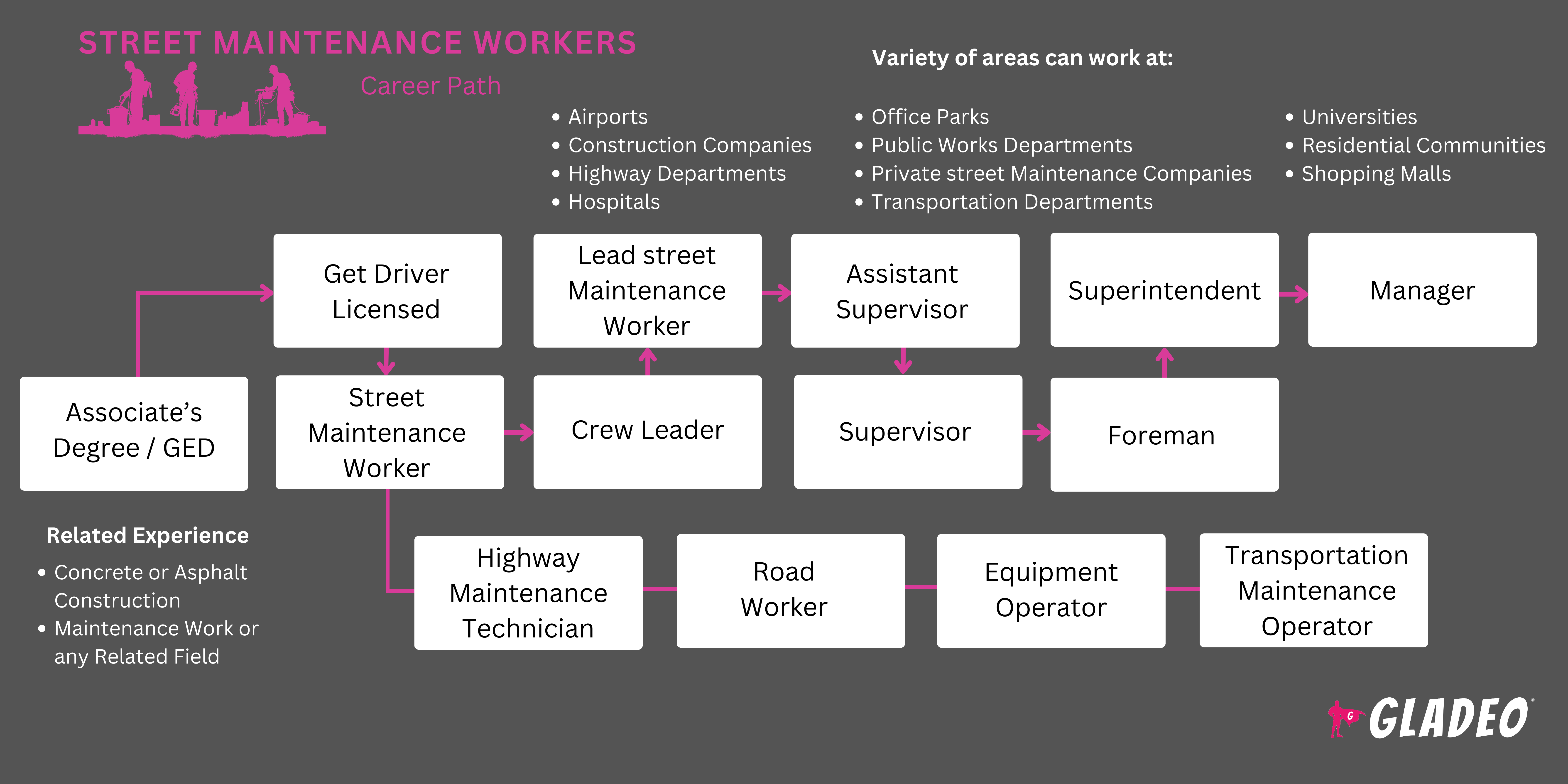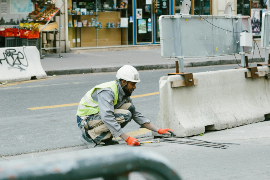Spotlights
Equipment Operator, Highway Maintainer, Highway Maintenance Crew Worker, Highway Maintenance Technician, Highway Maintenance Worker, Maintenance Technician, Maintenance Worker, Transportation Maintenance Operator, Transportation Maintenance Specialist, Transportation Worker
Our country is connected by a sprawling web of sidewalks and streets, literally paving the way for us to travel easily from place to place. But this complex network of public-use roads and walkways is often taken for granted – unless, of course, there’s a major pothole or crack somewhere.
Who is taking care of these heavily-used areas to ensure they’re well-maintained and safe to drive or walk on? That would be Street Maintenance Workers! These busy professionals work tirelessly to keep surfaces smooth and in good repair by laying new asphalt or cement, fixing cracks and potholes, clearing debris, and making sure water drainage systems work properly.
Without their efforts, there would be all sorts of transportation disruptions and unsafe driving conditions, especially in urban areas.
- Playing a key role in maintaining city infrastructure
- Improving community safety and accessibility
- Contributing to the beautification and functionality of roads and sidewalks
Working Schedule
- Street Maintenance Workers work full-time, with potential morning, night, weekend, and holiday shifts. They may be on call to respond to emergency situations.
Typical Duties
- Inspect road and sidewalk areas to look for hazards or damage
- Collaborate with city agencies and contractors on projects
- Prepare job sites as needed, such as setting up traffic barricades or lane closures
- Direct traffic away from working road crews
- Use heavy equipment such as jackhammers to break up old pavement
- Shovel and haul soil, sand, gravel, cement, asphalt mixes, etc.
- Mix concrete and cement
- Use hand tools (picks, shovels, rakes, rollers, etc.) for small tasks
- Repair and maintain roads, sidewalks, curbs, and drainage systems
- Lay and smooth asphalt and oil spray. Measure surfaces and paint road lines, curbs, and crosswalks
- Assist with installing and maintaining street signs, street lights, and traffic signals
- Remove or paint over graffiti
- Clean and clear streets, including sweeping debris and removing snow buildup
- Assist with road widening projects
- Respond to road-related emergencies
- Operate vehicles such as trucks, dump trucks, tractors, asphalt rollers, sweepers, snowplows, and potentially backhoes or front loaders
Additional Responsibilities
- Clean up work sites after job completion
- Follow safety procedures and wear suitable personal protective equipment
- Ensure proper handling and disposal of hazardous materials
- Keep up-to-date with industry best practices
- Train new workers
- Manage supply and material inventories
- Document maintenance activities
- Perform weed abatement. Apply herbicides as needed
Soft Skills
- Adaptability
- Attention to detail
- Communication skills
- Physical stamina
- Problem-solving abilities
- Safety-oriented
- Teamwork
- Time management
Technical Skills
- Basic carpentry, masonry, and pipefitting skills
- Blueprint and technical drawing reading
- Breaker hammers (aka jackhammers), air compressors, and pneumatic air tools
- Environmental and Department of Transportation regulations and practices
- Operating vehicles (such as trucks, dump trucks, tractors, bulldozers, graders, asphalt rollers, sweepers, snowplows, backhoes, front loaders, etc.)
- Road maintenance techniques, materials, and hand tool use
- Safety protocols and regulations. CPR and first aid
- Stump grinding
- Wear of personal protective equipment (such as gloves, goggles, safety-toed boots, and hearing protection)
- Municipal government and public works agencies
- Private construction and maintenance companies
- State and federal transportation departments
Potholes and problems with streets and pavement can be a major nuisance for residents. That’s why there’s a great demand for the services of Street Maintenance Workers, who often work in demanding conditions and extreme weather to get things fixed.
They may operate in heavy traffic areas and must keep a close eye out for oncoming vehicles, falling tree limbs, wildlife, debris from construction zones, and other potential hazards.
Physical endurance is crucial, as they regularly perform strenuous tasks such as lifting heavy materials, operating machinery, and working for long periods. They have also got to stay flexible when they’re on call for emergencies like floods or unexpected infrastructure failures. This unpredictability of schedules can disrupt one’s work-life balance sometimes, but being adaptable is part of this unique job!
Sustainability practices are becoming more prevalent in street maintenance, such as the use of eco-friendly recycled asphalt and permeable pavements. Green methods like cold patch asphalt repair and solar-powered street lights are also being adopted to reduce energy consumption.
Technological innovation is another trend, as the industry turns to automated and remote-controlled equipment to ensure workers can perform their tasks safely and efficiently. For example, in smart cities, Street Maintenance Workers might use sensors for real-time road condition monitoring, GPS for optimized routing, and data analytics for predictive maintenance. These technologies enable timely repairs and reduce costly last-minute emergency situations.
Street Maintenance Workers usually grow up being physically active outdoors. They likely had an interest in working with their hands and building or fixing things, too.
- Street Maintenance Workers usually need a high school diploma or GED and a driver’s license, at a minimum
- Employers may expect workers to have or be able to obtain a Commercial Driver’s License with certifications for various vehicles (i.e., dump trucks, tractors, bulldozers, graders, asphalt rollers, sweepers, snowplows, backhoes, front loaders, etc.)
- Vocational training in construction, maintenance, or truck driving can be beneficial
- Training in the safe use of heavy machinery such as jackhammers is also helpful
- Workers will receive basic on-the-job training
- CPR, first aid, and safety procedures are also typical training requirements
- Other training may include:
- OSHA 10-Hour Construction Safety Certification
- Pavement Management Certification
- State-sponsored Local Technical Assistance Road Scholar programs
- Traffic Control Technician
- Street Maintenance Workers don’t need a college degree, but applicable vocational training can help get your foot in the door!
- Look for programs offering ample hands-on training opportunities and courses in construction, maintenance, tool usage, vehicle operation, and safety.
- Check whether the school has partnerships with local governments or construction companies.
- To prepare for a Street Maintenance Worker position, you’ll want to do well in general math, shop classes, and physical education
- Volunteer for public works community service projects to get experience and meet people
- Seek part-time or summer jobs in landscaping, construction, or maintenance to learn how to safely use hand and power tools
- Take online courses related to safety and transportation
- Watch videos about the career field to learn what a day in the life is like
- Join relevant online forums and discussion groups to ask questions
- Keep track of all your work and academic accomplishments for your resume
- Sign up for classes related to construction and maintenance technology or programs to get certified in heavy equipment operation

- Search job portals like Indeed, Glassdoor, Craigslist, or local public works websites
- Review job ads and look for keywords to list on your resume, such as:
- Automated Equipment Operation
- Data Analytics
- Eco-Friendly Materials
- Emergency Response
- GPS Route Optimization
- Hazardous Environment Safety
- Infrastructure Maintenance
- Predictive Maintenance
- Road Repair
- Prepare a resume highlighting relevant skills and experience, including any vocational training or certifications
- Check out Street Maintenance Worker resume templates for formatting ideas
- Talk with friends you might know in the industry to learn about job openings
- Look for trade association apprenticeships or state-sponsored
Local Technical Assistance Road Scholar programs that might lead to a full-time job - Gather strong references from previous employers or instructors
- Conduct mock interviews with friends or your school’s career center
- Try to find sample interview questions such as “How do you ensure safety when working in heavy traffic areas?” or “How do you handle working in extreme weather conditions?”
- Demonstrate a commitment to public service and a strong work ethic during interviews
- Keep up-to-date on trends and new technologies in the field
- Dress appropriately for job interviews
- Let your supervisor know you are interested in advancement. Learn as much as you can about all the various aspects of street maintenance
- Develop a reputation as a reliable employee. Be at work on time and ready to go!
- Pursue additional certifications and training in advanced equipment operation and safety
- Volunteer for leadership roles or special projects to showcase your abilities
- Build strong relationships with colleagues and set the example for others
- Stay informed about new technologies and practices in street maintenance
- Keep growing your professional network and making deep connections within the industry
- Be active in professional organizations. Attend training sessions, workshops, and other events
- Stay current on regulatory changes
Websites
- American Public Works Association
- American Traffic Safety Services Association
- Asphalt Institute
- Equipment World
- Federal Highway Administration
- Institute of Transportation Engineers
- International Municipal Signal Association
- International Road Federation
- National Asphalt Pavement Association
- National Association of City Transportation Officials
- National Association of County Engineers
- National Center for Pavement Preservation
- National LTAP & TTAP Association
- Pavement Interactive
- Roads & Bridges Magazine
- Stormwater Report
- Traffic Technology Today
- Transportation Research Board
Books
- Infrastructure: A Guide to the Industrial Landscape, by Brian Hayes
- Road Repair Handbook: The Complete Guide to Fixing Roads and Driveways, by Roderick Johnston
- Street Maintenance Supervisor: Passbooks Study Guide, by National Learning Corporation
If you’re interested in a job that offers plenty of hands-on duties, but Street Maintenance work isn’t quite the right fit, then consider related careers such as:
- Construction Laborer
- Grounds Maintenance Worker
- Heavy Equipment Operator
- Highway Maintenance Worker
- Utility Worker
Newsfeed

Featured Jobs

Online Courses and Tools

Annual Salary Expectations
New workers start around $56K. Median pay is $74K per year. Highly experienced workers can earn around $82K.
Annual Salary Expectations
New workers start around $56K. Median pay is $71K per year. Highly experienced workers can earn around $91K.
Annual Salary Expectations
New workers start around $56K. Median pay is $68K per year. Highly experienced workers can earn around $80K.
Annual Salary Expectations
New workers start around $53K. Median pay is $63K per year. Highly experienced workers can earn around $80K.
Annual Salary Expectations
New workers start around $52K. Median pay is $64K per year. Highly experienced workers can earn around $72K.






